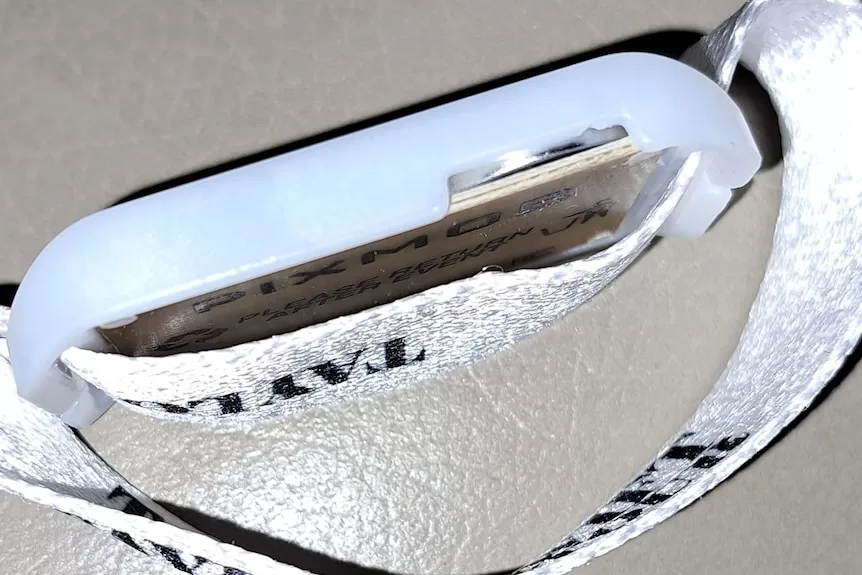- In short: The button batteries contained in wristbands issued to Taylor Swift concert-goers are potentially lethal.
- Three Australian children have died from ingesting button batteries.
- What’s next? Hundreds of thousands of Swift fans will be contacted by the touring company
Taylor Swift’s touring company will contact hundreds of thousands of fans about the danger of more than a million button batteries contained in wristbands that are being distributed on her current Australian tour.
The move comes after the Melbourne-based mother of a child who died in 2015 from ingesting a button battery raised concerns that wristbands from Swift’s Eras tour were not compliant with Australian standards.
Allison Burns lost her 14-month-old daughter Bella after the toddler consumed a lithium button battery from an unknown source.
“Unfortunately, the [Eras] wristbands did not meet new standards,” Ms Burns said.
“It contained no warning that it contained a button battery.
“It also had no medical information for the parents or the attendees.”
The light-emitting diode (LED) wristbands received by every Eras concertgoer can be activated to create visual effects around the stadium during performances.
Two batteries are contained in each wristband.
Frontier Touring and Consumer Affairs Victoria deny the batteries can be easily accessed and videos posted online show screwdrivers, pliers or other tools are required to extract the batteries.
Warnings issued
Frontier Touring will retrospectively contact 288,000 Melbourne concert-goers to warn them that the wristbands contain button batteries.
Safety tips for button batteries:
- If you suspect a child has swallowed a button battery call triple-0 or go to a hospital emergency department.
- Symptoms include noisy breathing or chest pain, problems swallowing, drool, vomiting blood, passing dark poo.
- Always dispose of used batteries properly by recycling at a designated facility.
- If recycling is not possible, tape batteries together to ensure a child will not be able to ingest them and put them in the bin.
- For more information The Royal Childrens Hospital Melbourne has a handy Fact Sheet.
“The LED wristbands for the upcoming Sydney concerts will be distributed with the appropriate warnings and medical advice,” Frontier Touring said in a message to Ms Burns.
“We are in contact with the relevant authorities, which are satisfied with the action being taken.”
About 320,000 people are expected to attend Swift’s four concerts in Sydney.
Attendees from the Melbourne shows began receiving messages from Frontier Touring on Friday.
“For those who took their LED wristbands home as a souvenir, the wristbands contain button batteries and should be kept out of reach of children, given button batteries are hazardous and can cause severe of fatal injuries in two hours or less if swallowed,” the message said.
“Medical attention should be sought immediately if it is suspected the battery has been swallowed.
“Please dispose of any wristband carefully.”
‘Deemed compliant’
Consumer Affairs Victoria said in a statement that it was satisfied the batteries were secured safely in a child-resistant plastic compartment.
“The wristbands have been deemed compliant with the button battery safety standards, meeting mandatory safety tests,” the statement read.
“The button battery safety standards state that products must have secure battery compartments to prevent children accessing the batteries.
“Button batteries must be supplied in child-resistant packaging.
“Consumer Affairs Victoria has been in touch with the concert organisers to request they reach out to ticketholders for the Melbourne concerts to inform them of the relevant safety warnings.”
The Australian Competition and Consumer Commission (ACCC) said it was aware of concerns about the wristbands and was liaising with state consumer agencies.
“All businesses, including manufacturers, importers, distributors and retailers, involved in the supply chain for button batteries – or products powered by them – must comply with the mandatory button battery safety and information standards,” the ACCC said.
“In Australia, three children have died from inserting or ingesting button batteries.
“When a battery is swallowed, a chemical reaction occurs that burns through tissue and seriously injures vital organs.”
The ACCC advised that consumers who suspected a child had swallowed or inserted a button battery should contact the 24/7 Poisons Information Centre on 13 11 26 for fast, expert advice.
People are urged to get help immediately and not wait for symptoms to develop.
The ACCC said it did not issue voluntary recalls and that the onus was on suppliers to follow guidelines, recall products voluntarily and remove them from the market.
Get our local newsletter, delivered free each Wednesday
